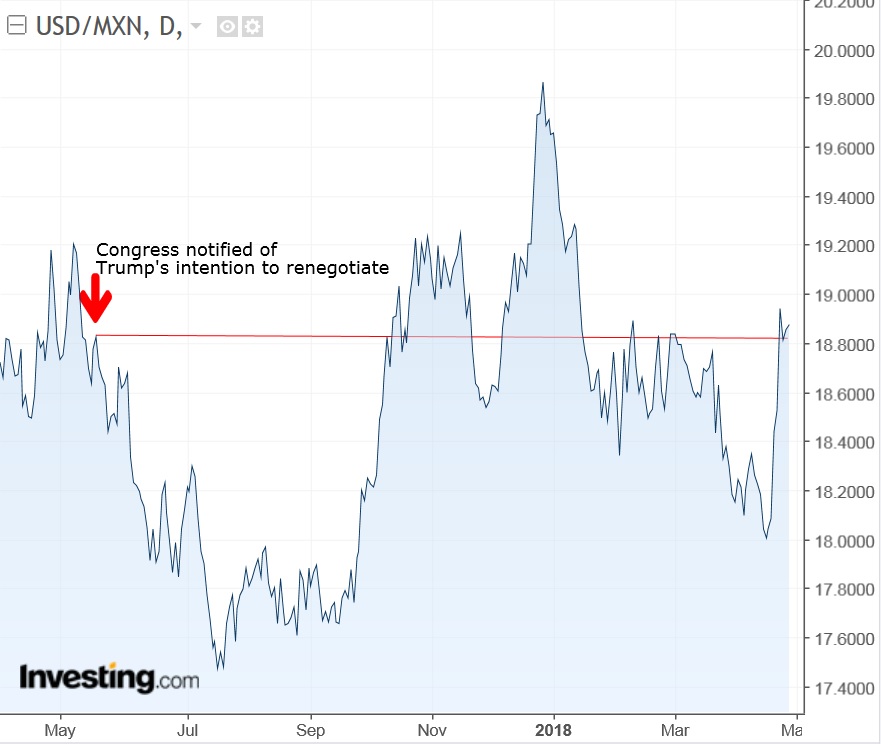- Vehicle origin sticking point close to resolution
- All three countries face political pressure to close a deal
- Markets have seen little overall impact and are likely to close the book on uncertainty
According to U.S., Mexican and Canadian officials, trilateral negotiations over the North American Free Trade Agreement (NAFTA) are coming to a “successful” end with a potential agreement widely touted to be just around the corner. All three countries appear to be under political pressure to get some type of accord into the headlines, though markets will likely do little more than finally close the book on the temporary distraction.
Agreement On Vehicles Near Completion
U.S. President Donald Trump has said he could get a NAFTA deal done "quickly" although he refrained from promising to actually cement a deal. NAFTA negotiators have said a preliminary framework could be reached in early May.
“In the coming 10 days, we can really have a new agreement in principle,” Moises Kalach, who represents the Mexican private business sector at the talks, said on April 24.
One of the major sticking points for the U.S., rules of origin for vehicles, was touted by Canadian Foreign Minister Chrystia Freeland as being nearly reached.
Trump's negotiators initially demanded North American-built vehicles contain 85% of parts made in NAFTA countries by value, up from the current 62.5%. However, reports point to the agreement centering at a lower 75%, with certain components coming from areas with higher wages.
Political Pressure Urges Swift Resolution
The timing should hardly surprise markets given Freeland’s constant insistence that the renegotiated package would be “win-win-win.” All three countries are facing upcoming political events and locking down a claim to “victory” toward the end deal is essential for each of their voter bases.
Mexico has been the major focus with upcoming elections on July 1. All parties involved have commented on the need to avoid negotiations running into the country’s campaign schedule. Particularly noteworthy, Andres Manuel Lopez Obrador is the clear presidential frontrunner and if the final agreement is portrayed as a victory for Trump at the cost of Mexico, Lopez could have incentive to lash out against the current government’s deal as he seeks to maintain support.
Also placing pressure on getting the deal done, Mexico’s Senate must approve it and September 1 is the date for newly elected officials to take over, three months before the new President takes office on December 1. The current government is urgently trying to close the deal so they can take credit.
Renegotiating NAFTA was a large part of Trump’s presidential campaign and there is a certain sense that the Republican Party is looking for a “win” here, to help garner support for midterm elections arriving in November.
A significant factor is the timeframe involved in the U.S. as passage of any agreement by Congress would also likely take months. On the plus side, NAFTA renegotiation appears to have bipartisan support, although some political experts warn that Democrats now attempting to claw back political clout in Congress may be unwilling to back the President’s initiative simply to avoid favoring the Republicans ahead of the midterm elections.
Canada is also in the mix—although admittedly to a lesser degree—since the province of Ontario will hold a general election on June 7. While Prime Minister Justin Trudeau won’t be put to the polls until 2019, he does rely heavily on support from the largest province by population. Quebec too will hold elections on October 1.
Why Markets Will Likely Look Past Any Deal
Political noise can often cause market jitters, but they rarely have a lasting impact. In simple terms, all the parties involved are anxious to close a deal and take political credit as part of their agenda. Independently of what the details of a final pact are, politicians will almost certainly claim a resounding victory, even if it amounts to nothing more than soundbites dedicated to their own agenda.
Though the Mexican peso has been trading almost solely on speculation of an eventual deal—with its ups and downs dependent on the most recent political noise—it has lost just around 0.2% against the dollar since May 18, 2017 (see chart below) when United States Trade Representative Robert Lighthizer notified Congress of Trump’s decision to enter into negotiations with Canada and Mexico “as soon as practicable.”

Additionally, the Mexican stock market is up by just around 0.2%, likewise implying that despite all the political noise, the overall effect of the NAFTA uncertainty has been largely negligible. Though negotiations have dragged on interminably, all parties involved are facing pressure to declare a “win.” The final details will likely be just another case of political background noise. In all probability markets will be content to close the book on this increasingly minor chapter and move on to bigger worries.
